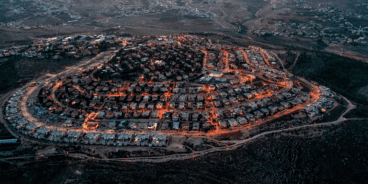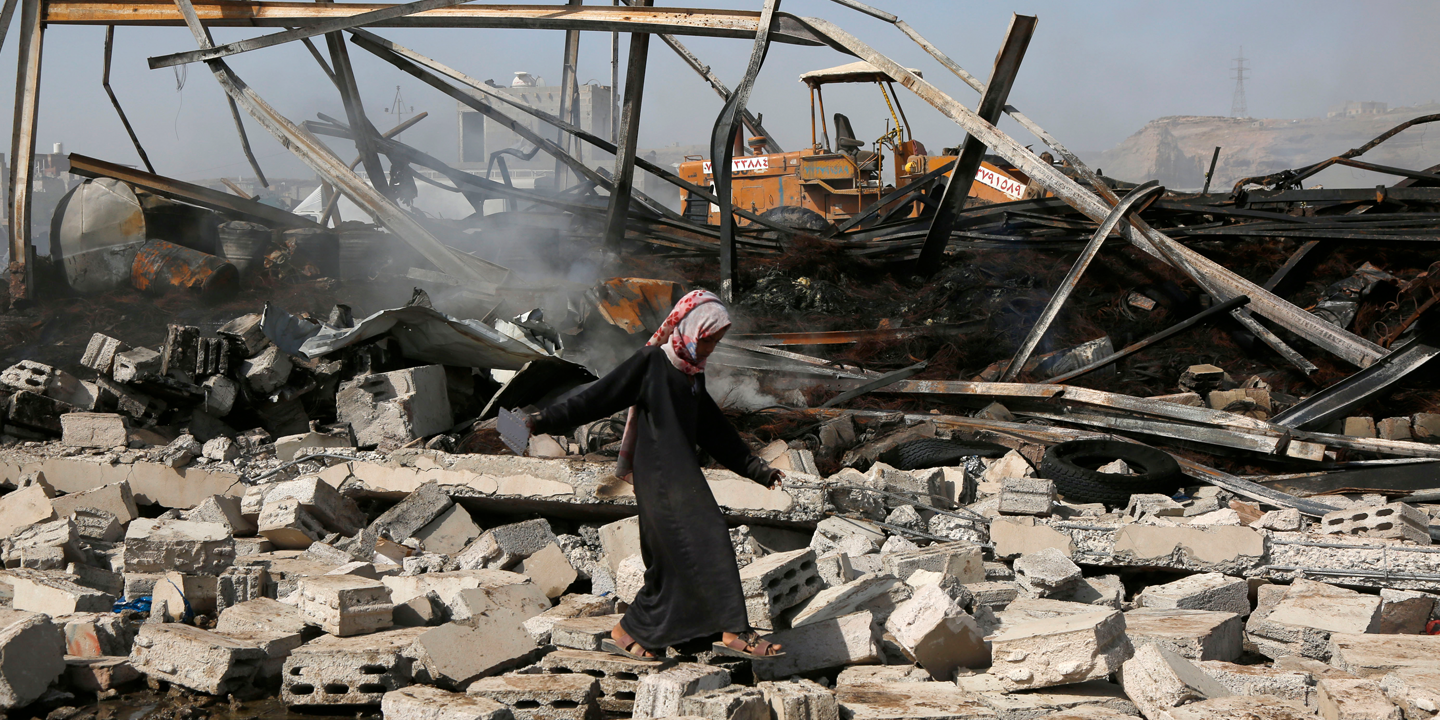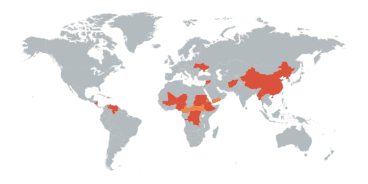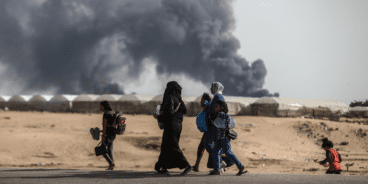

Atrocity Alert No. 214: North Korea, Yemen and Iraq
Atrocity Alert is a weekly publication by the Global Centre for the Responsibility to Protect highlighting situations where populations are at risk of, or are enduring, mass atrocity crimes.
UN report exposes ongoing crimes against humanity in North Korea
On 28 July the UN Office of the High Commissioner for Human Rights (OHCHR) released a report detailing human rights violations against women who were detained after being forcibly returned to the Democratic People’s Republic of Korea (DPRK), or North Korea. The report is based on the first-hand accounts of women who were able to escape the country.
Those who manage to leave North Korea and seek sanctuary in foreign countries risk being forcibly returned and arrested by DPRK’s notoriously repressive security forces. Many are imprisoned without trial, with sentences ranging from several months of penal labor to indefinite detention in camps for political prisoners. According to OHCHR, women detainees face serious human rights violations and abuses, including “deprivation of food, torture and ill-treatment, forced compulsory labor, and gender-based violence.” Women who spoke with OHCHR investigators recounted harrowing experiences of beatings and rape by guards, as well as forced abortion and infanticide.
In 2014 a UN Commission of Inquiry (CoI) reported that DPRK’s government systematically violated the human rights of its people and found that individuals at the highest level of government were responsible for potential crimes against humanity. These systematic violations and abuses included “extermination, murder, enslavement, torture, imprisonment, rape, forced abortions and other sexual violence, persecution on political, religious, racial and gender grounds, the forcible transfer of populations, the enforced disappearance of persons and the inhumane act of knowingly causing prolonged starvation.” Six years later, OHCHR’s new report suggests that these crimes continue unabated.
In the words of the UN High Commissioner for Human Rights, Michelle Bachelet, “These accounts show once again the systemic nature of human rights violations in the DPRK, and the need to keep seeking pathways to proper accountability for such crimes… The UN Human Rights Office will continue to gather evidence of this kind to support a process of criminal accountability, whenever and wherever possible.”
All countries should respect the international legal principle of non-refoulement and not forcibly repatriate individuals to DPRK who are at risk of serious human rights violations and abuses. The UN Security Council should urgently discuss potential crimes against humanity that continue to be perpetrated in North Korea and refer the situation to the International Criminal Court.
2 million Yemenis face ‘acute food insecurity’ as fighting intensifies
After more than five years of war, civilians in Yemen are facing the combined threats of acute food insecurity and the COVID-19 pandemic. According to the Yemen Data Project, there has been a marked increase in airstrikes so far this year with more than 1,000 air raids carried out by the Saudi Arabia/United Arab Emirates-led international coalition. Violations of International Humanitarian Law (IHL) perpetrated by all parties to the conflict, including attacks on civilians and civilian objects, continue with impunity. The UN Human Rights Council-mandated Group of Independent Eminent Experts (GEE) on Yemen has argued that these violations may amount to war crimes.
On 7 July the United Kingdom (UK) resumed arms sales to Saudi Arabia after previously halting such transfers in order to conduct a year-long assessment of alleged human rights violations perpetrated by the Saudi-led coalition. The assessment concluded that there was “no clear risk” of future breaches of international law. The following week, airstrikes conducted by the coalition killed at least 20 civilians over the span of three days.
Meanwhile, the Food and Agriculture Organization has reported that more than 2 million people in Yemen face acute food insecurity. Despite this, funding for aid operations in Yemen is reportedly on the verge of collapse. These risks are compounded as Yemen’s health system – largely damaged or destroyed by five years of war – struggles to combat the rapid spread of the COVID-19 virus. Only half of Yemen’s healthcare facilities are operational while hospital equipment and medicine are extremely scarce.
Following airstrikes that killed at least 11 civilians on 15 July, the UN Humanitarian Coordinator for Yemen, Lise Grande, said that, “What we’re seeing is horrible. The only way civilians will be safe in Yemen is when the parties finally decide to stop fighting.”
Amidst escalating violence and a devastating humanitarian and health crisis, the UN Security Council must prioritize the security and protection of Yemeni civilians and help end Yemen’s internecine conflict once and for all. In keeping with the Arms Trade Treaty, all UN member states should immediately halt the sale of weapons to parties to the conflict who continue to routinely violate IHL, including Saudi Arabia.
Commemorating the 6th anniversary of the Yazidi genocide
This Monday, 3 August, marked six years since the so-called Islamic State of Iraq and the Levant (ISIL), launched a campaign of armed violence targeting religious minorities in northern Iraq. As the extremist group overran the Sinjar region, ISIL fighters attempted to systematically destroy the Yazidi population. In the weeks following 3 August 2014, ISIL killed over 5,000 Yazidi men and boys and subjected over 7,000 women and girls to execution, sexual violence and enslavement. Some Yazidi boys were also separated from their families, forced to convert to Islam and recruited as child soldiers.
The UN Commission of Inquiry (CoI) on Syria documented ISIL’s crimes, arguing that the group had “committed the crime of genocide as well as multiple crimes against humanity and war crimes against the Yazidis.” Despite the military defeat of ISIL in Iraq during 2017, the group continues to pose an ongoing threat to civilians, preventing displaced Yazidis and other vulnerable civilians from returning home. An estimated 2,800 Yazidi women and girls also remain missing or in captivity. Those Yazidi women and girls who have returned to their families face myriad challenges as they cope with the debilitating physical and psychological consequences of the genocide.
Yazidi genocide survivor and Nobel Peace Prize laureate Nadia Murad stated on Monday that, “The world watched in outrage and demanded that tangible action be taken to end the genocide. But six years later, the international community has failed to keep its commitments to protect those most vulnerable, especially women and children.”
Six years have passed since the genocide began, and yet no member of ISIL has been held legally accountable in Iraq for atrocity crimes perpetrated against the Yazidis. Iraqi courts have relied almost exclusively on counter-terrorism laws to prosecute thousands of ISIL members, including foreign fighters. Meanwhile, Yazidis, Christians and other minority populations are still waiting for justice.
The UN Investigative Team for Accountability for Da’esh/ISIL (UNITAD) has identified 160 ISIL-affiliated individuals who could potentially be held legally responsible for atrocity crimes. In cooperation with the Iraqi government, UNITAD has also excavated 17 mass graves in and around the village of Kocho where ISIL captured, enslaved or killed approximately 1,200 Yazidis.
The Iraqi government should work with UNITAD and Yazidi survivors’ organizations to incorporate genocide, war crimes, and crimes against humanity into domestic legislation. Jahaan Pittalwala, Research Analyst at the Global Centre for the Responsibility to Protect, said, “Now is the time for the Iraqi government to work with the international community to credibly prosecute ISIL members in front of the survivors of their atrocities and the eyes of the world.”
Related Content


